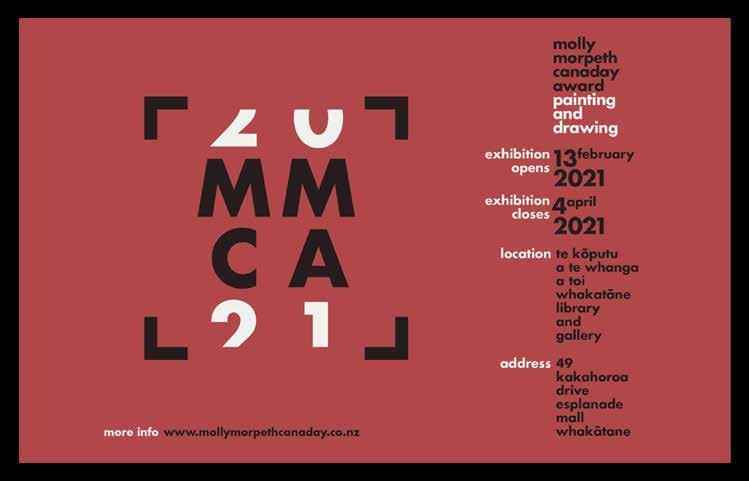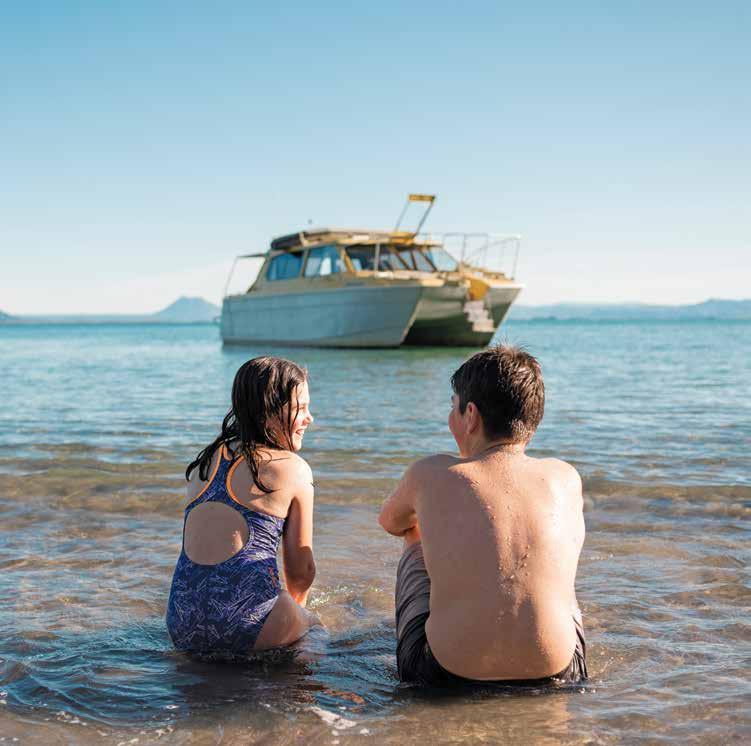
6 minute read
SANCTUARY ISLAND Moutohorā/Whale Island is one of the Bay of Plenty’s best-kept secrets, an island sanctuary that awaits.
Sanctuary Island
PHOTOGRAPHY SUPPLIED, COURTESY OF WHAKATĀNE DISTRICT COUNCIL New Zealand is kind of spoilt for national parks and untouched nature, but a small island sanctuary in the Eastern Bay of Plenty really is something special; and there’s never been a better time to visit Moutohorā – Whale Island – just 9 km off the coast of Whakatāne.
Advertisement
ON A CLEAR DAY, it looks like you can swim – maybe even just wade – to Moutohorā. Popularly known locally as Whale Island, it seems to float lazily in the harbour just a stone’s throw away, calm and serene, beckoning and mysterious. According to locals, when cloud condenses just over the island and Moutohorā ‘wears its hat’ it is a sign of good luck, but in any weather it seems to bring a smile to your face – it’s the perfect southern Pacific isle, verdant and green, a veritable sanctuary just off shore.
The 143 ha island is in fact the remains of a once complex volcanic system – now long gone – that has eroded down to the two sleepy peaks we see today; the only hint of its once considerable power remains in the odd whisp of steam from amongst the green on chilly mornings.
For local Māori it was a place of refuge and resource – an island escape when conflict came to the mainland, with fish and mutton birds in abundance – and archaeological remains of a major pā (found, naturally, on Pā Hill), as well as gardens and middens, can still be seen there today. Europeans also saw it as a resource, setting up a whaling station (somewhat optimistically; it was abandoned without landing a single whale) and mining rock and sulphur.
In 1965 however, Moutohorā was finally recognised as the natural wonder it represents and was declared a wildlife refuge. Purchased by the Crown in 1984, a programme soon got underway to restore the island to what it had once been by eradicating the wild goats that had been introduced and re-establishing native flora and fauna. Over the years some 12,000 plants covering 45 species have now been planted, a kiwi colony has been established, and all cats, rats, stoats and goats have been given an unceremonious heave ho so as to restore it as much as possible to the coastal jewel it was centuries ago.
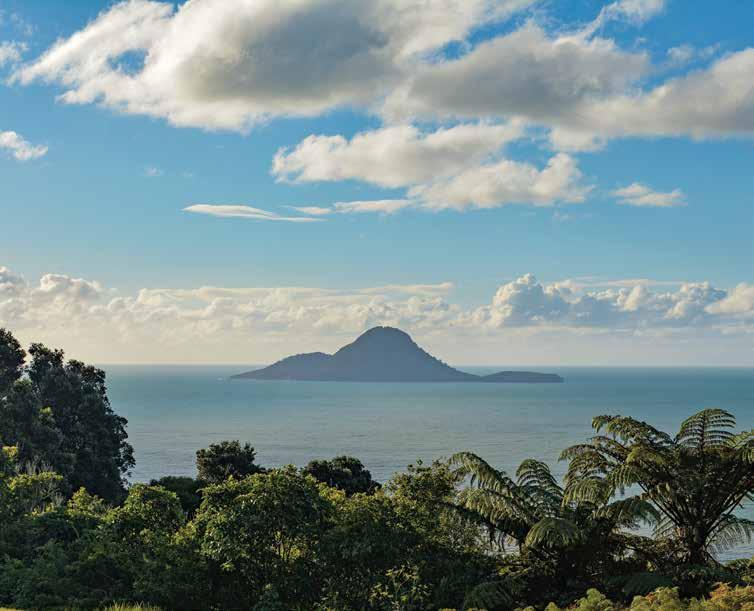
And what a jewel it is. Up close, the shimmering green island in the harbour becomes a richly layered tapestry of native New Zealand plant life. Pōhutukawa, māhoe, kānuka, bracken and grassland abound, resplendent in those certain shades of green that only Aotearoa can do.
The most significant feature of Moutohorā’s current animal life is the breeding colony of grey-faced petrels, but sooty shearwaters, little blue penguins, the threatened New Zealand dotterel and variable oystercatchers also breed on the island in addition to more common species of forest birds, captive-bred red crowned parakeets, three lizard species and fur seals, the latter of whom make occasional forays over to the mainland to the delight of Whakatāne locals. More threatened species which are occasional visitors include the Caspian tern, the North Island kaka and New Zealand falcon. And, according to the wonderful world of Harry Potter at least, Moutohorā is also the home of a professional Quidditch team, the Moutohorā Macaws, though sightings are, well, rare.
The really good news is that you don’t have to view Moutohorā from afar, but can get up close and personal via one of the guided tours that generally visit the island on a daily basis weather permitting (private landings are not permitted). Ticket prices include landing fees to help support the work carried out on Moutohorā and getting there is a short 15-20 minute boat ride that is manageable even for those whose sea legs are a bit out of practice.
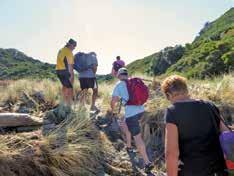
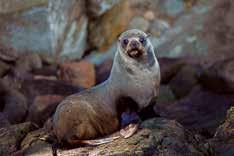
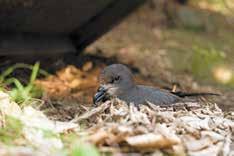
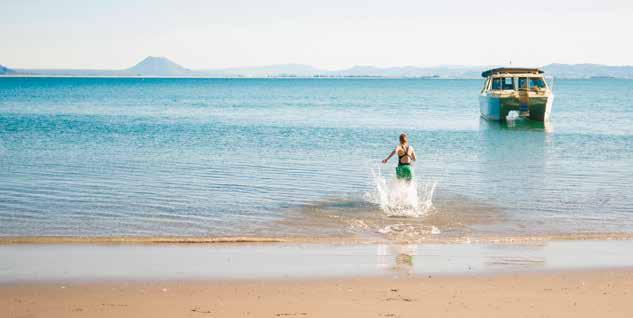
Visit Moutohorā Island Sanctuary - Aotearoa’s best-kept secret.
whakatane.nz whakatane.com
The tours offer great local knowledge of the island’s history and its flora and fauna, but it’s not all facts and figures and Latin bird names by a long shot. Visitors can take a swim at Onepū/Sulphur Bay, a naturally warm water beach, and even dig their own personal hot pools in the sand along the shore, looking back – for a change – at the mainland that seems a world away. A highlight for many are the seals, lazing on the rocks around the island, particularly when the pups are young and at maximum cuteness.
But perhaps the best thing about Moutohorā is that it is ultimately the sum of all its parts; the bird life, the native plants, its ancient history and the more recent story of how so many people came together to help get the island back to as nature intended it. In a world that seems increasingly to be losing the battle against the destruction of our natural environment, Moutohorā stands as something of a beacon – still mysterious and beckoning – but showing us all just what can be achieved.
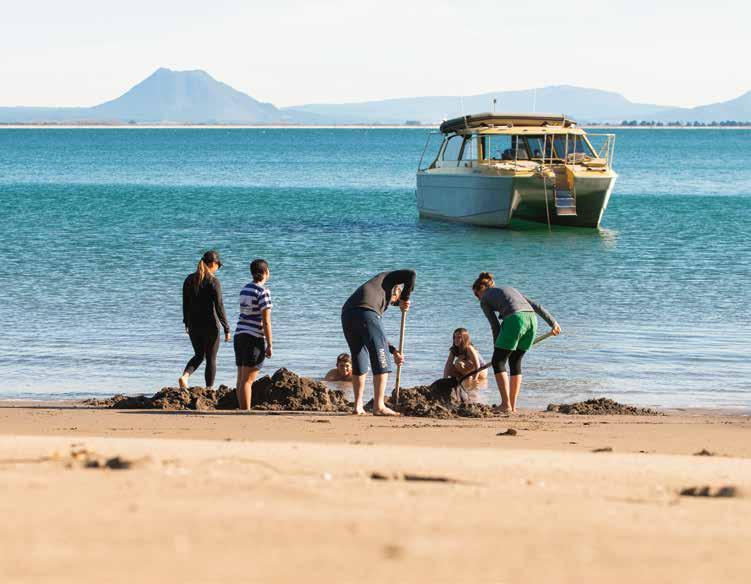
2021
SUMMER ARTS FESTIVAL
We are excited to be presenting a wide range of amazing arts events for the community this summer season - all organised by local people, and taking place in the Eastern Bay of Plenty. Here are the events and dates to put into your diary. All the event details will be coming soon to our website: www.artswhakatane.co.nz
ArtChatham Mag half page.indd 1
NIGHT OWL CINEMA
FRIDAY 15 & SATURDAY 16 JANUARY
ART IN THE PARK
WEDNESDAY 20 JANUARY - SULLIVAN LAKE Family Friendly fun organised by Sullivan Lake Care Group. Cost: Free
NATIONAL YOUTH BRASS BAND
FRIDAY 22 JANUARY Eastern Bay Brass Event
DANCE CARNIVAL
SATURDAY 30 JANUARY 10am - 12pm. Wharaurangi. Koha
February
WAITANGI DAY REGGAE IN THE PARK
SATURDAY 6 FEBRUARY Noon. Awatapu Lagoon - the floodgates end. Family friendly event, bring a picnic and enjoy the sunshine and music. Cost: Free
CARVING SYMPOSIUM & ART EXHIBITION
6 - 14 FEBRUARY Whakatane Rose Gardens
MOLLY MORPETH CANADAY PAINTING & DRAWING EXHIBITION
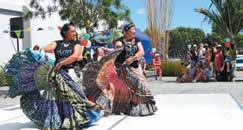
SUNDAY 13 FEBRUARY - SUNDAY 4 APRIL Te Kōputu Exhibition Centre, Whakatāne Cost: Free Presented by Arts Whakatāne and exhibition partner District Council, this national award aims to support and promote artists by presenting painting and drawing work.
FRESH MARKET JAZZ IN THE PARK
SATURDAY 20 FEBRUARY 5-8 pm. Whakatāne Rose Gardens. Cost: $5 donation Bring a picnic, sit back and enjoy live music. Supported by local acts. Kid friendly - children free!
March
QUILT SHOW 26-28 MARCH
SCHOOL ART
FLORAL ART DEMO
SHADES OF BLUE 27 MARCH
29/10/20 3:56 PM
